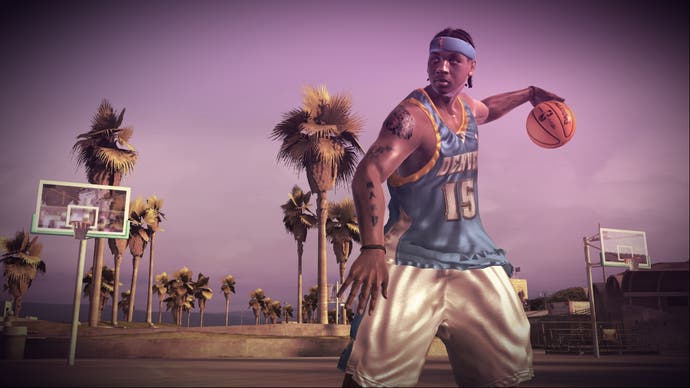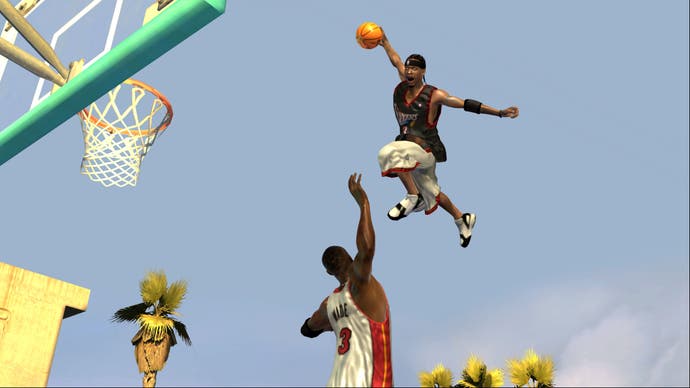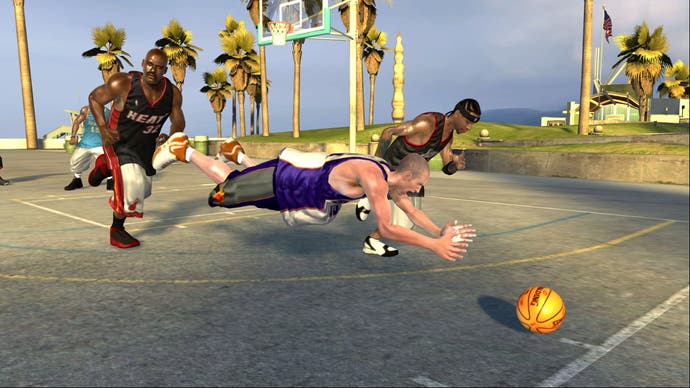NBA Street Homecourt
Big fun.
NBA Street has always been the coolest kid on the EA Sports block. Granted, that's hardly difficult: one imagines the EA Sports block as a bland paradise of picket fences, tidy lawns and clean concrete, where everyone wears pastel smart casual and buys the same car as the neighbours each year. Everything is orderly, efficient and prosperous, and all NBA Street has to do to be the coolest is show up: in a pair of Air Jordans, naturally, and ambling along in its own sweet time. (Two years between updates? Two?)
It has its coterie of hangers-on, of course - EA Sports BIG stablemates like NFL Street and FIFA Street - but they're just white-bread boys with their caps turned backwards; putting it on, aping the moves of the original and best, and not doing it very convincingly either. Basketball is much better suited than football from either side of the Atlantic to the Street style. Street means smaller sides (three on three in this case) and a fast-paced, physical game that flouts conventional rules, and introduces a wonderfully absurd, showboating trick system. In fact, not only is videogame basketball better suited, it's actually better full stop in this form: more dynamic, more sophisticated, and better to watch than regular NBA-licensed games.

NBA Street games are basically exercises in taunting. When in possession, you perform tricks with the ball, dancing around your opponents (literally dancing, many of the tricks are adapted breakdancing moves), bouncing the ball off their heads and through their legs, making them look as foolish as possible for a long as possible before attempting to score. Doing so charges your Gamebreaker meter - but only if you convert by scoring. Once it's full, you can unleash an even more outlandish arsenal of tricks in a short-term charge that will multiply the score from your next shot or dunk.
When defending, your task is to physically manhandle the ball away from the goal and out of your opponent's possession with blocks and slaps and crunchy tackles, and maybe even steal their Gamebreaker bonus in the process.
It's more than a mere veneer of flashy animation and edgy, extreme-sports cool. It's an excellent arcade game system, with an exquisitely poised balance of risk and reward: the longer you keep a trick combo up, the harder it is to maintain and the more there is to lose, especially once the Gamebreaker is activated. It's satisfying to master in single-player, and gives lends great momentum, aggression and white-knuckle tension to multiplayer matches.
Homecourt doesn't mess with this spot-on formula, but it does take a typical (and fairly sensbible) approach for the first next-gen title in a long-runing series. It strips the game right back down to basics, throwing away much of the development and elaboration that happened on the way to 2005's NBA Street V3. This is both a good and a bad thing.
The good bit: tricks' assignment to the right stick has been abandoned, with just two face buttons - modified by holding down the right and left bumpers - providing a remarkably accessible and flexible control scheme. Tricks are easier to pull off and more spectacular, while keeping a similar depth, and there are smart button prompts to ease you in.

There's now a double-dunk - triple in Gamebreaker mode - if you hold down the button for exactly the right time (shown on a meter in which is wisely hidden in multiplayer matches) - this is fun, but a bit overpowered and will get monotonous once more players are more skilled. Dunks connect with massive, gratifying force, and goalkeeping is almost as satisfying, although control and timing in defence is generally a bit sticky and unpredictable compared to the razor-sharp offence game.
The bad bit: the selection of modes is pretty basic and lightweight. Gamebreaker and Trick battles - the object of the first being to only score points with Gamebreaker activated, of the second to max out your trick meter without having to convert and score - are very obvious ideas that are diverting for a while, but ultimately spoil the rhythm of the game, while a classic balling mode just misses the point completely.
The campaign mode, Homecourt Challenge, is better, getting the most out of the game's unique atmosphere and providing plenty of kit to collect as you build your own baller's stats up through a series of challenges against NBA stars. Just a shame that V3's exhaustive create-a-player utility has, in a naked bit of corner-cutting, been replaced with the opportunity to mix the features of three NBA stars into one invariably hideous freak.
For all that the game is built on really solid foundations, NBA Street is still fundamentally about style over substance, about strutting its stuff on the court and off. Presentation matters desperately to these games, and EA's incredibly high professional standards have to be matched with something much harder for its corporate style to pull off: actual cool.

Homecourt almost totally succeeds. Earlier games still had a hint of arcade brashness but this latest is laid all the way back: scruffy courts on late afternoons, a superlative soundtrack of deep funk and educated hip-hop, menus done on a typewriter and a laconic voiceover spinning lazy lines about life on the street. It looks great and sounds better, with some of the most naturalistic court chatter you'll ever hear. Some of the grainy visual filters are overdone, and the sentimental homeboy philosophising of the theme is taken a bit too seriously, but they're tiny slip-ups, all told.
Punchy and immaculately produced, NBA Street Homecourt is a great jumping-on point for a simple, entertaining and really well-designed series. It doesn't have much to offer veterans of the games beyond a stylistic makeover, though, and the game modes and trick system lack a little too much depth and breadth to really satisfy in the long term. But if you're after a slick and pacy sports game with legs in multiplayer (and there's something wrong with you and you don't like Virtua Tennis), you can't do much better right now.

